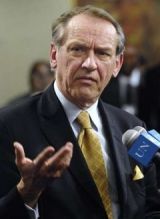UN laments growing tribal clashes in Darfur
May 18, 2007 (UNITED NATIONS) — Warning of growing tribal clashes in Darfur and radicalization of displaced youths in camps, UN special envoy Jan Eliasson on Friday stressed the urgency of a “credible negotiating process” to end the conflict in Sudan’s war-torn region.

Khartoum reached a peace agreement with Darfur rebels in May last year in Nigeria but only one of three negotiating rebel factions endorsed the deal and violence has since continued.
Eliasson, a former Swedish foreign minister and ex-president of the UN General Assembly, told reporters here that he and Salim had asked Khartoum to stop its bombardments of villages in Darfur and rebels to cease their military activities.
But he highlighted what he called “a new dimension” in the Darfur conflict.
“More people are (now) killed in tribal clashes” within both black and Arab tribes than in fighting between rebels and government forces.
He also warned against a growing “radicalization” of youths in camps for displaced persons and against “the risk of militarization” because of growing inflow of weapons.
He welcomed a recent spurt in regional peace initiatives, including mediations by the autonomous government of south Sudan, Libya, Saudi Arabia, Eritrea and Egypt.
But he said it was now time to have a “convergence process” bringing all these initiatives “under one roof”, referring to his joint mediation with the AU.
Eliasson stressed the need for “a massive effort to find a political solution” in the next few months focusing on “wealth sharing, power sharing and security.”
He said it was now time to give “much more importance to the political process” although it should be pursued in parallel with the separate peacekeeping track.
Sudanese President Omar al-Beshir recently agreed to allow the deployment of some 3,000 UN troops to boost an ineffective African Union (AU) peacekeeping force in the huge, arid region.
But he has yet to agree to the third and final phase of a UN plan that is to culminate in the dispatch of a joint AU-UN force of around 20,000 troops to Darfur, where AU peacekeepers have failed to stem four years of bloodshed.
The raging conflict has cost at least 200,000 lives and forced more than two million people from their homes, according to the United Nations, though Khartoum contests those estimates, saying 9,000 people have died.
(AFP)
